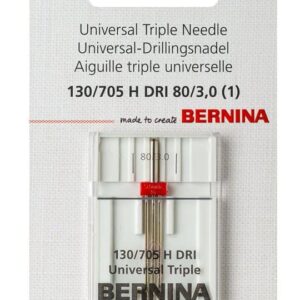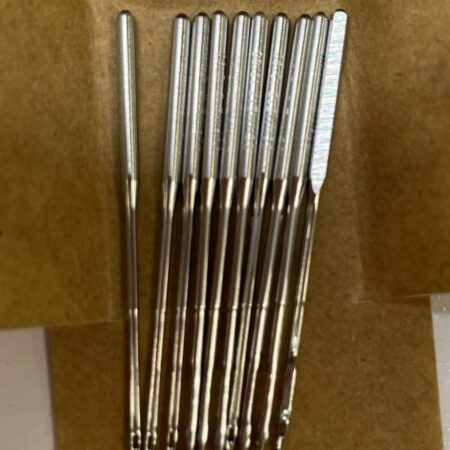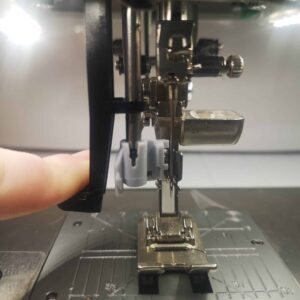Category: Sewing Machine Needles
Sewing Machine Needles
Showing 49–52 of 52 resultsSorted by price: low to high
Which Sewing Needle Should I Buy?
The best needle to buy will depend on your machine and the type of project you’re working on. Each type of needle is designed to excel in certain conditions.
Fortunately, you don’t need to guess which one is best for you - read on for tips on getting the most out of your needles and some tips on which to buy if you’re unsure.
How to Use Each Type of Sewing Needle
Topstitch Needles
Topstitch needles are typically used for multi-directional quilting, as the longer needle eye is far easier to thread.
Topstitch needles are also good at ensuring fewer skipped stitches - a vital strength for a stitch-heavy project like a quilt.
To get the most out of your topstitch needles, thread 2 threads at once (or use thicker thread) to perform beautiful decorative and topstitching work.
Suitable fabrics
Topstitch needles aren’t just great for quilting - they’re solid all-rounders. Still, the long eye helps it excel especially at quilting and patchwork jobs, or whenever you’re working with thicker thread.
Jersey Needles
Jersey needles have a medium ballpoint, which overrides the loops and helps to prevent damage to your sewing materials.
Each fabric type will require a specific needle size, so adapt this to suit the needs of your projects.
Suitable fabrics
Fabrics that work well with jersey needles include:
- Jersey
- Ajour
- Cotton knitwear & knitted fabrics
- Bouclé
- Corsetry fabrics
- Sweatshirt fabric
- Faux fur
- Gauze
- Tulle
- Reversible fabrics
Stretch Needles
Stretch needles are designed especially to avoid skipping stitches on stretchier fabrics. This is achieved with a flatter shank compared to other needles of similar sizes, resulting in a needle closer to the hook - which subsequently prevents skipping.
Suitable fabrics
Stretch needles work best with elasticated or stretchy knitted fabrics - in fact, the stretchier the material, the better the needle performs!
It’s also great for:
- Swimwear fabrics
- Fine jersey, silk jersey, single jersey and velour cloth
- Cotton knitwear
Jeans/Denim Needles
Needles made specifically for denim - the clue is in the name! The medium-sized ballpoint pushes aside the fabric threads and penetrates the resulting gaps without damaging the material. Additionally, Jeans and Denim Needles need to be operated with reduced force to ensure needle breakage is less likely to occur.
To further counteract this, the blades of these needles are designed to prevent breakage and counteract skipped stitches.
Suitable fabrics
Any strong and thick fabric will likely benefit from Jeans/Denim needles, including:
- Jeans
- Twill
- Canvas
Microtex
Microtex needles have a special point that promotes stitch accuracy on delicate and densely woven fabrics.
A microtex needle is notably suitable for sewing straight stitches, like when topstitching along edges of fabrics. The more delicate composition also allows for attractive topstitching on collars or button stays.
Suitable fabrics
- Silk and any microfiber fabric
- Lining taffeta
- Lamé
- Microtex needles can also be effective on coated materials such as foil and oilcloth, as well as some synthetic leathers.
Leather Needles
Like denim needles, the clue on the best use of leather needles is in the name.
To get the most out of your leather needles, select a larger stitch length on your machine and remember to check that the thread is not cut through when backstitching.
Top tip: while leather needles can work effectively on hard synthetic leather, take care with softer synthetics, as tearing can occur easier on delicate faux leathers. If you’re worried about this happening, try a Microtex needle first.
Suitable fabrics
- Leather (of course!)
- Paper (for processing thin brochures)
Quilting Needles
Quilting needles have a very fine point that easily gets through the standard three layers of a quilt without causing damage to the fabric layers.
Suitable fabrics
- All cotton fabrics being used for patchwork, topstitching and other quilt work
Metallic Needles
Metallic needles are used to sew with metallic threads.
Metallic embroidery can be tricky to get to grips with and so should always be sewn at a slow pace to prevent breakage.
If you’re looking for a size of metallic needle other than NM 80 or 90, the topstitch needle can make a worthy substitute in many cases.
Embroidery Needles
Last but not least, embroidery needles are just what you want for every form of embroidery, as they make embroidery on sewing machines a simple affair.
The needle’s larger eye accommodates thicker threads and yarns, as well as special effect or metallic embroidery yarns. With a medium ballpoint, damage can be avoided between both the embroidery yarn and the base material. Thread breakage is also addressed with embroidery needles thanks to the larger eye and a wider thread groove to mitigate friction.
Embroidery needles are the ideal choice for household embroidery when you don’t have a designated embroidery machine, as they’re designed to fit with modern sewing machines as well as embroidery machines themselves.



